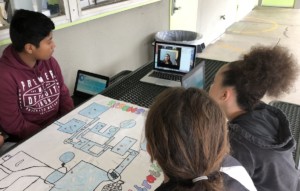Smart Cities Denver: Where Advocates & Partnerships Are Making an Impact

Denver has a high ratio of advocates per capita. To some extent it’s imported talent because it’s a great place to live. The advocates form partnerships that benefit families and kids. While some long sought gains were reversed by a combination of the Great Recession and anti-tax measures, Denver remains an example of why advocacy matters.
Barbara O’Brien kicked the Colorado Children’s Campaign (CCC) into high gear in the early 90s and was influential in shaping the state charter law in 1992. CCC inspired many of the solid charter networks and reform groups in Denver including DSST, Democrats for Education Reform (DFER), Get Smart, TFA, Colorado Succeeds, A+ Denver, and many community organizations active in education.
Van Schoales, director of A+ Denver, took on high school reform in 2001. He helped Superintendent Charlotte Ciancio kick off the portfolio of new schools in Mapleton—a small district north of Denver with New Tech, two Expeditionary Learning schools. Van also worked with and convinced David Greenberg, an attorney, to launch Denver School of Science and Technology, probably the best high poverty STEM network in the country with seven (soon to be eight) high performing Denver area schools. The DSST network also has a thoughtful character development program
There is a history of productive business partnerships in Colorado. The Public Education & Business Coalition supports teacher development. Colorado Succeeds has a more aggressive reform agenda. Barbara and Van along with Moira Cullen, Terrance Carrol, Peter Groff, and Mike Johnston launched DFER Colorado. Jen Walmer has since become the director of and influencing legislation and candidates.
Districts. Serving more than 80,000 students in 162 schools, Denver Public Schools benefits from what is probably the best and most aggressive elected board in the country. Superintendent Tom Boasberg is extending the portfolio direction set by Senator Michael Bennett. Since doing so, DPS has expanded their working team created for the Gates Foundation-funded next-gen systems work to have even broader engagement across the district to advise on both school development and the work being done to redesign their personal learning ecosystem.
Supported by Gates-funded Next Generation Learning Challenges, “West Generation Academy, a new turnaround school launched by Generation Schools Network on the site of Denver’s West High, includes many hallmarks of next-generation blended design.” Denver-based investment firm Janus gave DPS $2.1 million grant to support several new blended learning lab sites.
The shift to competency-based learning in Adams 50 district has received national attention. The district was featured in our paper The Shift From Cohorts to Competency.
Douglas County is an affluent high performing district south of Denver. The choice friendly district has 12 charter schools. It was one of the first public districts to create a private school scholarships, but the program is on hold following a court injunction.
Colorado Springs School District 11 is a tech savvy district with an “innovation agenda deployed in manageable chunks.” After an extensive review they selected ST Math, a visual game-based approach from MIND Research Institute for system wide deployment with impressive results.
St. Vrain Valley Schools in Longmont (north of Denver) won $16.6 million in the RTTD competition and is developing a STEM feeder pattern.
Charters. 2013 was one of the biggest growth years for charters in Colorado ever. There are 190 charter schools in the state, almost two thirds are in metro Denver (see the Charter League of Charter Schools list). With big changes in Jefferson County, Denver may be the center of charter growth as Strive, DSST, and KIPP as they continue to expand.
Strive Preparatory Schools, originating as West Denver Prep, is a high performing network of 6 middle schools and two high schools. Founder and CEO Chris Gibbons is former director of Denver Summerbridge.
CRPE scores Denver pretty high on the 7 dimensions of portfolio strategy, but Denver only scores a C+ on Brookings Education Choice and Competition Index (putting it in the Chicago and Newark category). Colorado ranks 14th out of 50 states on the Parent Power Index from CER.And while Digital Learning Now gave Colorado an overall grade of C- on its 2013 Report Card, the goings-on transpiring in Denver warrant all of our attention.
Get Smart Schools prepares leaders and teams to open new autonomous schools and transform struggling schools. They’ve worked with 14 teams to date and President Barbara O’Brien and her superstar board plan to support 50 schools by the end of the decade.
Funders. Denver has an active group of local philanthropists. The Donnell-Kay Foundation has emerged as a national leader in next-gen models. After a stint with the state, as Assistant Commissioner of Education, Amy Berk Anderson returned to lead ReSchool Colorado, a multi-year effort to create a new state public education system. While working for the commissioner, Amy launched a number of projects funded by Colorado Education Initiative led by Yee-Ann Cho.
Rose Community Foundation has been a capable leader on educator effectiveness and extended learning. The Gates Family Foundation is a big supporter of charters, next-gen models, and innovations in governance.
Kevin Hall left the Broad Foundation to launch the Charter School Growth Fund in an emerging tech corridor between Denver and Boulder. Alex Hernandez (@ThinkSchools) joined a few years later and has become a leading expert on tech-infused school models.
Carrie Morgridge leads her family foundation which benefits Colorado and Florida kids with forward leaning programs like ShareFair, edtech grants to schools, and a big boost to the school of education at the University of Denver (DU).
The Daniels Fund adopted and transformed DU’s business school infusing a mission of ethical business practices. They support charter schools, innovative policy and leadership.
EdTech. Denver has an undersized EdTech presence with few big players or startups.
Pearson acquired a couple Denver businesses including eCollege. The division supports 9 million mostly higher ed students with the LearningStudio platform. Pearson also purchased Knowledge Technologies. The PKT division develops and supports automated scoring solutions including WriteToLearn (featured here and here).
ScholarCentric surveys measure engagement and promote resilience in Denver, Clark County, Broward, Chicago and a growing number of districts nationwide.
Boulder, 30 miles northwest of Denver, is a hub for startups and they held a startup weekend last fall but there’s still not many edupreneurs.
Higher Ed. Dan Ritchie’s leadership at DU changed the skyline of south Denver with lots of new buildings. In 1994, Ritchie donated a sprawling ranch to fund matching grants to the university, to date it has brought in more than $50 million.
Mining magnate Bruce Benson is president of the University of Colorado which serves over 60,000 students on four campuses and is basically a private school given the lack of state funding.
Chris Romer (a former CCC board member) founded American Honors, a new Denver-based low cost 2+2 pathway to brand named degrees.
Policy. Colorado submitted a solid proposal and should have won a Race to the Top grant. It did pick up a small consolation prize for early learning.
Keeping Pace says there are about 15,000 students in full time online programs. There are five online statewide charters including Calvert, Colorado Virtual Academy, GOAL Academy, Hope Online, and Provost and 22 multi-district programs and a dozen single district programs.
Super Senator Mike Johnston led a valiant but unsuccessful effort to reform school finance–an approach aligned with a Digital Learning Now on weighted, portable, and performance-based funding.
Conclusion. Denver benefits from passionate advocates and productive partnerships, but there is little edtech innovation and few innovative blended school models.
The Chamber doesn’t look as involved in education as they used to be. They should recognize that economic development is all about education in the long run. In the near term, EdTech could be a growth category that would help spur innovations in learning.
A critical DPS board race in November saw reform candidates sweep the race ensuring the portfolio approach will continue and options will improve in the second half of the decade.
A state and city innovation agenda that would boost access to internet devices and broadband and support new school models would benefit kids and the community. The good news for Denver is that advocates are on the case.
The Smart Cities blog series catalogs innovations in learning in America’s great cities. We’re writing a book about what we’re learning–and you can help.
Thanks to Mary Ryerse, Dave Guymon, and Van Scholes for help updating this post.
Pearson, MIND Research and Digital Learning Now are Getting Smart Advocacy Partners.






0 Comments
Leave a Comment
Your email address will not be published. All fields are required.